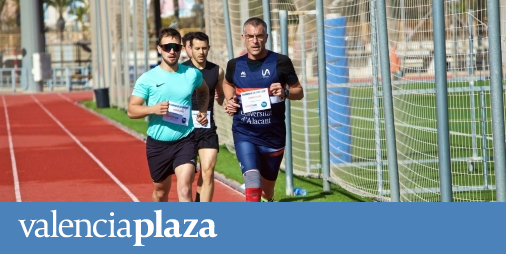VALENCIA. (EP) Listening to edited music to mark rhythms during the practice of a race is a “useful” tool for improving results and, in turn, preventing injuries in amateur runners, according to a study by the University of Alicante (AU).
The research, which has measured the abilities of more than 25 people, has performed tests of time and number of strides, and has been published under the title ‘The use of musical feedback increases stride frequency in recreational runners’ in the journal International Journal of Environmental Research and Public Health.
The research team, made up of Roberto Cejuela Anta, Sergio Sellés Pérez, Lara Eza Casajús and Miguel Martínez Moreno, from the University of Alicante, and José Fernández Sáez, from the Rovira i Virgili University, has managed to capture one of the first results of the new philosophy implemented by the UA Sports Secretariat, directed by Cejuela himself, which aims to establish constant synergies between research and sports practice in the university community, reports the academic institution in a statement.
Specifically, the aim of the study was, say the researchers, “to check whether musical feedback training with a given rhythm would lead to improvements in stride frequency and that it would be stable over time, leading to an increase in preferred stride frequency.
To do this, they have worked with a sample of runners, as people who practice running in an amateur way are popularly known, who were measured during training divided into two groups, one that ran with music created according to the rhythm of the race at that was intended to arrive (experimental group) and a second that was monitored without the use of music during the race (control group).
In turn, both groups were integrated in a balanced way by women and men. The measurements were made in three sessions during periods separated by 15 days to 20 runners (11 men, 9 women) who had not suffered recent injuries and who met minimum personal and sporting parameters, such as being of legal age, being active runners and run more than 15 kilometers per week.
Prior to the measurement in the race, an examination of the individual physical capacities of the participants was carried out and they solved questionnaires on sports history, history of injuries and musical tastes with which the researchers would determine the rhythms of the music to listen to during training.
After carrying out the pertinent monitoring of the running sessions of the twenty participants in the study, it has yielded various conclusions”. “The most singular is that “it has been shown that, indeed, there was an improvement in the stride frequency in the experimental group, which used musical feedback during their continuous running sessions,” explains Cejuela.
To which is added that “due to the increase in stride frequency, the risk of injury can be reduced, since the resistance forces are reduced and, among other aspects, the stabilization of the hip during the race is improved and reduces tibial shock.
However, it details that the benefits of listening to music during the race are not limited only to the improvement of results, but are also “a stimulus that favors the learning of the running technique and, consequently, reduces the risk of injury” .
Thus, it confirms that it has different effects on both running speed and heart rate, so “performance is improved, and interactions with the tempo of the music are associated with different benefits such as lengthening the exhaustion time, acceleration of the rate of recovery after exercise and increased work time”.
In addition to the beneficial effects in physical terms, music also has a positive contribution on a psychological level, since “it helps to regulate emotions, which means increasing the athlete’s motivation and which makes it a tool that helps improve performance, so it is considered a pleasurable stimulus”, specifies Cejuela.
In short, the study concludes that there were significant improvements in the experimental group in the different tests, while the differences between the tests of the control group were not significant. The results showed that training with musical feedback helps to increase stride frequency in runners, a fact that may be of great interest to improve running technique parameters.
In the same way that such results are established, the research team clarifies that both the sample and the measurement time used are somewhat reduced, for which reason future research is recommended to broaden these results.
–


